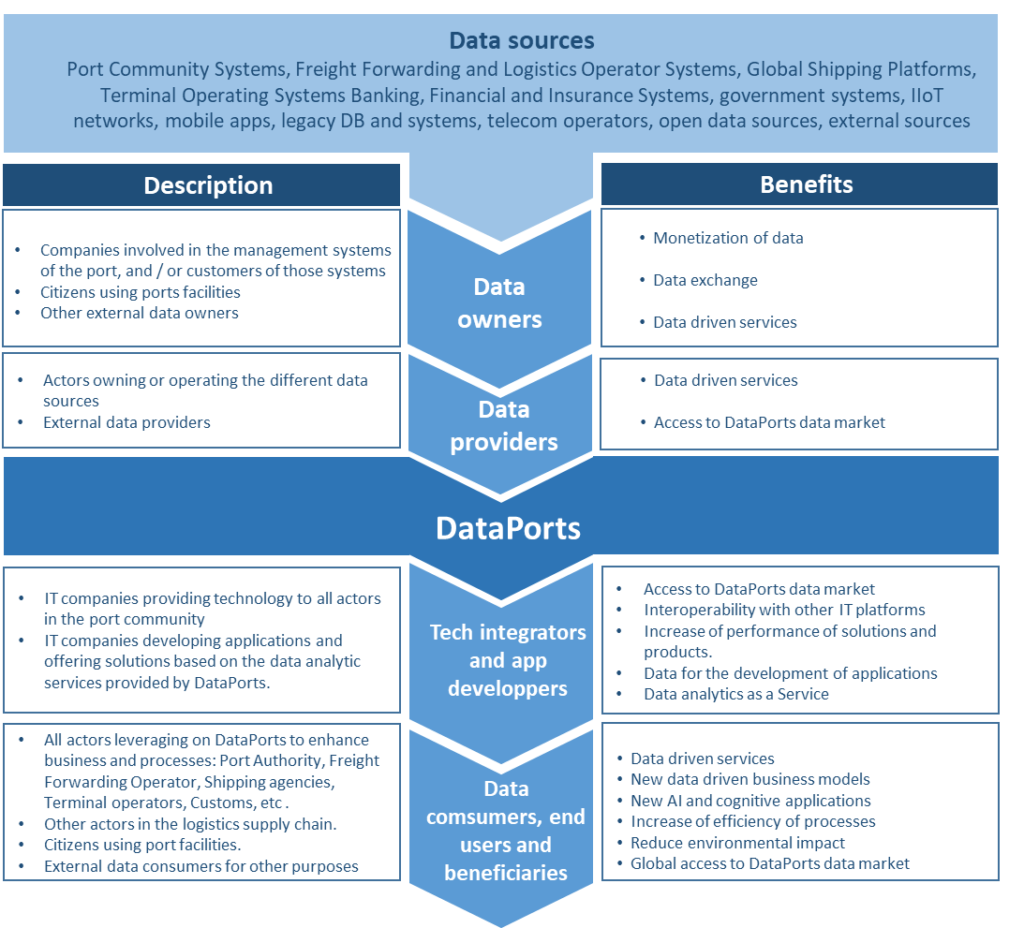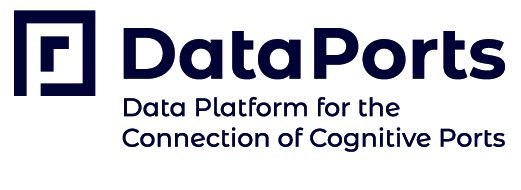The main goal of the DataPorts project is to comprehensively address non-covered aspects of data platforms, with a specific application to transportation logistics in port environments in order to achieve cognitive PCS and improve data management between involved stakeholders.
DataPorts aims to design, develop, set-up and operate a data platform for the trusted, secure and reliable data sharing and trading among the actors operating in the diverse supply chains involved in the seaports, also enabling the connection with other stakeholders in the logistics supply chain. The adoption and use of this Data Platform by existing connected / digital ports will imply their transition to actual cognitive ports, taking real advantage of the huge amount of data produced by the stakeholders and opening the way to new capabilities:
- Real-time control of operations
- Streamlined decision making
- Accurate prediction of future events and situations
- Prescriptive analytics.
DataPorts will:
- Offer all the necessary services to provide security and protection features of data shared and traded between the diverse stakeholders of the freight transport chains, and easily plug them into different Port Community Systems, Single Windows and other government systems, for formalities and controlling trade and transport, ensuring a unique source of truth.
- Ensure the needed anonymization or de-identification mechanisms while preserving the individual features that are required for effective big data analytics, and will also provide a better, more secure and resilient environment to exchange data for conducting business, running operations and reconcile them with financial flows on a real time and individual operation.
- Provide a smart, secure, reliable and trusted ecosystem, a clear framework for the stakeholders to safely exchange and share data, and clear rules on where the data will be stored and how will be accessed, a flexibility of the policies on data distribution, different platform governance capabilities and interoperability among different platforms.
- Rely on existing digital and computing platforms in the port community, such as Port Community Systems, Freight Forwarding and Logistics Operator Systems, Global Shipping Platforms (i.e. Tradelens, INTTRA, etc.), Terminal Operating Systems, Banking, Financial and Insurance Systems, and other government systems.
- Enable the connection to external sources of data (including both internal and external freight movement business like banking, insurance, government, ocean shipping, ports, airports, international logistics and parcel industries), which will enrich the data-driven process in the Smart Freight Transport. In addition to enable a real connection among ports, allowing them to share data and knowledge, to track vessels and other assets through the entire supply chain, and to share best practices and find synergies for a more efficient management.
Therefore, the ultimate goal of DataPorts is the development, set-up and operation of a Cognitive Port Data Platform that will entail the interconnection of a wide variety of systems into a tightly integrated ecosystem, so that seaports all across Europe could benefit from the results of this project in order to create an even more trusted, reliable and efficient way of conducting businesses in Europe and reinforce the European Single Market.
Data platform heterogeneity will be turned from a crucial problem to a great advantage as there will be no need to wait for a unique standard for an interoperable environment, neither developing proprietary ad-hoc bridges between data sources. DataPorts data platform will provide the support for advanced services for cognitive ports, linking the platform with existing initiatives and results from areas like IoT, Big Data analytics or Artificial Intelligence.

To support transportation and logistics processes and designed to be scalable and extendable up to European level. The stakeholders of the data platform may be categorised in general in:
- Data Providers as scalable heterogeneous sources that will feed data into the data platform. In this sense, IoT platforms, IT systems (open or private), PMS/PCS controlled by the ports or Market Agents.
- Data Consumers that can be the same data providers or interested parties related withtransportation and logistics.
DataPorts platform will embrace all agents that would get value over the industrial data, following the strict data governance rules, supported by ICT enablers. Moreover, the platform will give particular emphasis on the facilitation of cognitive service providers that are benefitted from the decentralised, privacy-aware architecture of the platform. The main enabling technologies that facilitate this are a combination of semantic interoperability, artificial intelligence, blockchain techniques and big data analytics enablers, supported by a scalable architecture, combined with smart contracts and encryption solutions.
